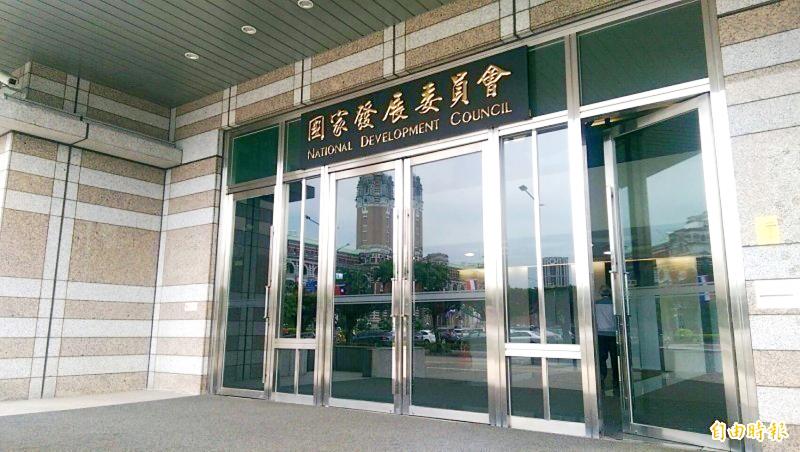Taiwan’s GDP could expand more than 4 percent this year on the back of strengthening exports, private investment and consumer spending, despite lingering uncertainty due to the COVID-19 pandemic, the National Development Council (NDC) said in a statement on Wednesday.
The projection came three days before the Directorate-General of Budget, Accounting and Statistics (DGBAS) is to update its growth figures tomorrow, after a forecast in November last year of a 3.83 percent pickup.
Exports last month spiked 36.8 percent year-on-year and are likely to expand by 3 to 8 percent this month, despite the week-long Lunar New Year holiday, the Ministry of Finance said last week.

Photo: Taipei Times file photo
The DGBAS forecast a 5.2 percent increase in exports this quarter, but the actual showing could prove twice as strong, the ministry said.
Demand for electronics used in smartphones, laptops, TVs and other technology products remains strong worldwide, as countries are expected to emerge from the COVID-19 crisis in the second half of the year, the NDC said.
Four percent growth would be stronger than most other economies, the council said, adding that the target can be reached if the government presses ahead with efforts to help companies upgrade, and guides idle funds from the private sector to infrastructure projects and business start-ups.
The government is considering removing restrictions in the insurance industry to give life insurance companies more financial incentive and greater flexibility to invest in social welfare ventures and public works projects, the council said.
It would also expand the cap for angel funds from NT$2 billion to NT$5 billion (US$70.6 million to US$176.49 million) to help groom local start-ups, it said.
The government also aims to team up with local lenders to create a financing mechanism that would provide NT$100 billion of loans for green ventures, the council added.
Meanwhile, electronics supply chains might continue to realign, driving local companies in foreign countries to move manufacturing facilities for high-end products back to Taiwan, the council said.
The migration would increase well-paid job opportunities and bolster private investment, it said.
Research bodies at home and abroad are forecasting GDP growth of 3.2 percent to 4.3 percent in Taiwan this year, the council said.
Vaccination against COVID-19 would allow the world to recover from the pandemic later this year, the council said, adding that it is closely monitoring how vaccination efforts unfold.

Intel Corp chief executive officer Lip-Bu Tan (陳立武) is expected to meet with Taiwanese suppliers next month in conjunction with the opening of the Computex Taipei trade show, supply chain sources said on Monday. The visit, the first for Tan to Taiwan since assuming his new post last month, would be aimed at enhancing Intel’s ties with suppliers in Taiwan as he attempts to help turn around the struggling US chipmaker, the sources said. Tan is to hold a banquet to celebrate Intel’s 40-year presence in Taiwan before Computex opens on May 20 and invite dozens of Taiwanese suppliers to exchange views

Application-specific integrated circuit designer Faraday Technology Corp (智原) yesterday said that although revenue this quarter would decline 30 percent from last quarter, it retained its full-year forecast of revenue growth of 100 percent. The company attributed the quarterly drop to a slowdown in customers’ production of chips using Faraday’s advanced packaging technology. The company is still confident about its revenue growth this year, given its strong “design-win” — or the projects it won to help customers design their chips, Faraday president Steve Wang (王國雍) told an online earnings conference. “The design-win this year is better than we expected. We believe we will win

Chizuko Kimura has become the first female sushi chef in the world to win a Michelin star, fulfilling a promise she made to her dying husband to continue his legacy. The 54-year-old Japanese chef regained the Michelin star her late husband, Shunei Kimura, won three years ago for their Sushi Shunei restaurant in Paris. For Shunei Kimura, the star was a dream come true. However, the joy was short-lived. He died from cancer just three months later in June 2022. He was 65. The following year, the restaurant in the heart of Montmartre lost its star rating. Chizuko Kimura insisted that the new star is still down

While China’s leaders use their economic and political might to fight US President Donald Trump’s trade war “to the end,” its army of social media soldiers are embarking on a more humorous campaign online. Trump’s tariff blitz has seen Washington and Beijing impose eye-watering duties on imports from the other, fanning a standoff between the economic superpowers that has sparked global recession fears and sent markets into a tailspin. Trump says his policy is a response to years of being “ripped off” by other countries and aims to bring manufacturing to the US, forcing companies to employ US workers. However, China’s online warriors